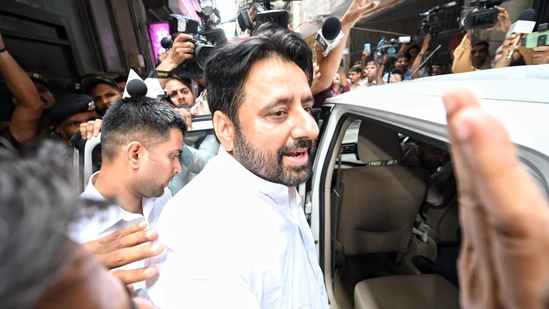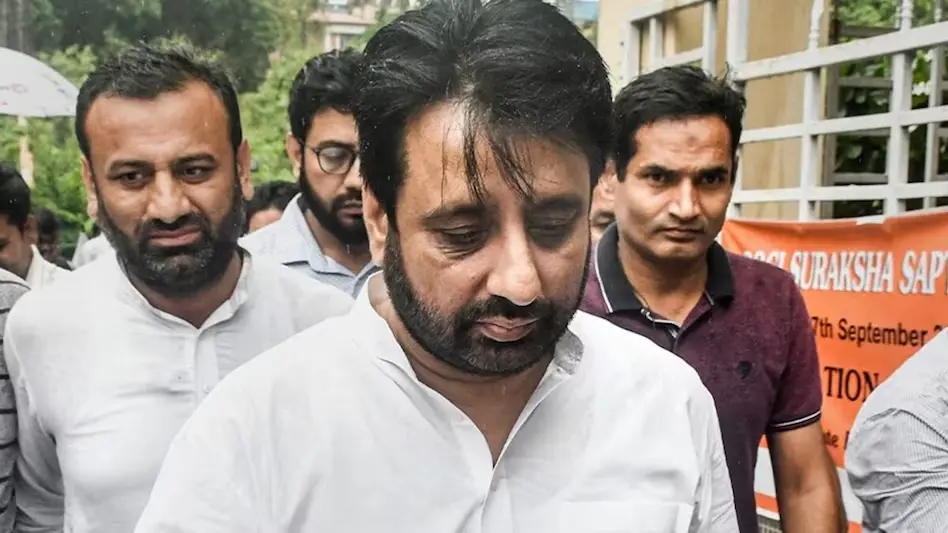
New Delhi, September 2, 2024 — Amanatullah Khan, a senior leader of the Aam Aadmi Party (AAP) and the sitting Member of the Legislative Assembly (MLA) from Delhi’s Okhla constituency, was arrested by the Enforcement Directorate (ED) on Monday after an exhaustive six-hour interrogation. The arrest marks a significant development in the ongoing investigation into an alleged money laundering case linked to the Delhi Waqf Board, which Khan has chaired since 2016.
The arrest of Khan, who is widely regarded as one of AAP’s most influential leaders, has sent ripples across the political landscape, raising questions about the motives behind the investigation and its potential impact on the forthcoming Delhi Assembly elections.
Background of the Case: The Waqf Board Controversy
Amanatullah Khan’s troubles began in 2023 when the Central Bureau of Investigation (CBI) filed an FIR accusing him of corruption, financial irregularities, and misuse of office during his tenure as the chairman of the Delhi Waqf Board. The FIR was based on allegations that Khan had been involved in siphoning off funds meant for the maintenance and welfare of Waqf properties. These properties, which are held in trust for the Muslim community, are intended for religious or charitable purposes, and the misuse of these funds is considered a serious offense.
The Delhi Waqf Board, under Khan’s leadership, manages hundreds of properties, including mosques, graveyards, schools, and commercial establishments. The controversy arose when several board members and community leaders alleged that Khan had allocated contracts and leases in a non-transparent manner, favoring entities and individuals linked to him.
The ED, which enforces economic laws and fights financial crimes, took up the investigation after the CBI’s findings suggested possible violations of the Prevention of Money Laundering Act (PMLA). The ED’s probe aimed to uncover whether Khan had laundered money by diverting Waqf Board funds through a network of shell companies and benami (proxy) accounts.
The Interrogation and Arrest: A Six-Hour Marathon
On September 2, 2024, Khan was summoned to the ED’s headquarters in New Delhi for questioning. The interrogation, which began in the early morning, was part of the ED’s ongoing efforts to gather more information about the financial dealings of the Delhi Waqf Board under Khan’s stewardship. The ED officials, according to sources, were particularly interested in several large transactions that they believe could be linked to money laundering.
During the six-hour interrogation, Khan was asked to provide detailed explanations for various financial decisions made during his tenure as the Waqf Board chairman. This included the allocation of funds for property development, the leasing of Waqf properties, and financial transactions that appeared suspicious in nature. Khan, who has consistently denied all allegations, reportedly maintained his innocence throughout the questioning.
However, sources within the ED have indicated that Khan’s responses were unsatisfactory and inconsistent with the evidence collected so far. As a result, the ED decided to place him under arrest. An official statement from the ED confirmed the arrest, citing concerns that Khan might tamper with evidence or attempt to influence witnesses if he were allowed to remain free.
The arrest has raised the stakes in a case that has already seen considerable political and legal maneuvering. For Khan, who has been a key figure in AAP’s political strategy, this arrest could mark a turning point in his career and have broader implications for his party.
Political Ramifications: AAP’s Response and Public Outcry
The arrest of Amanatullah Khan has not only intensified the ongoing legal battle but has also sparked a political firestorm. The Aam Aadmi Party, which governs Delhi, was quick to condemn the arrest, calling it a clear case of political vendetta by the central government. AAP leaders argue that the arrest is part of a larger pattern of using central agencies to target opposition leaders who pose a challenge to the ruling Bharatiya Janata Party (BJP).
In a statement issued shortly after Khan’s arrest, Delhi Chief Minister Arvind Kejriwal expressed his dismay, stating, “Amanatullah Khan is a dedicated public servant who has always worked tirelessly for the people of Delhi, especially the marginalized. This arrest is an attempt to silence those who speak out against the central government’s policies.”
Kejriwal’s comments were echoed by other AAP leaders, who have rallied around Khan in a show of solidarity. The party has also organized protests across Delhi, demanding Khan’s immediate release and denouncing what they describe as the misuse of central investigative agencies.
On social media, the hashtag #IStandWithAmanatullah began trending, with AAP supporters and sympathizers voicing their support for Khan and criticizing the ED’s actions. Many have drawn parallels between Khan’s arrest and previous cases where opposition leaders have been targeted by central agencies, suggesting a pattern of political persecution.
However, the BJP and other opposition parties have dismissed these claims, arguing that the law must take its course and that Khan should cooperate fully with the investigation. BJP spokespersons have pointed out that the ED is an independent agency and that its actions are based on evidence, not political considerations. (India Today, The New Indian Express).

Legal Implications: What’s Next for Amanatullah Khan?
Amanatullah Khan’s arrest is likely to lead to a protracted legal battle, with both sides preparing for a fierce courtroom confrontation. The ED has already indicated that it will seek to extend Khan’s custody to further investigate the alleged money laundering activities. Legal experts believe that Khan’s defense team will challenge the arrest and the grounds on which it was made, arguing that the case against him is politically motivated and lacks substantive evidence.
The case will also test the limits of the PMLA, a powerful law that has been criticized for being used selectively against political opponents. Under the PMLA, the burden of proof shifts to the accused, who must demonstrate that their financial dealings are legitimate. This has made the law a potent tool in the hands of investigative agencies but has also raised concerns about potential abuses.
For Amanatullah Khan, the immediate challenge will be to secure bail, which may prove difficult given the serious nature of the charges against him. The ED is likely to argue that Khan’s release could hinder the investigation, citing the risk of evidence tampering and witness intimidation.
Broader Implications: Impact on Delhi Politics and AAP
The timing of Khan’s arrest is particularly significant, coming just months before the Delhi Assembly elections. As one of AAP’s most prominent Muslim leaders, Khan has played a crucial role in the party’s outreach to the Muslim community, which constitutes a significant voting bloc in several Delhi constituencies, including Okhla. His arrest could complicate AAP’s efforts to maintain its stronghold in these areas, especially if the case drags on and Khan remains in custody.
Moreover, the arrest could also impact AAP’s broader political strategy. The party, which has positioned itself as a staunch opponent of the BJP’s policies, particularly on issues related to minorities, may find itself on the defensive as it navigates the fallout from Khan’s arrest. The BJP, on the other hand, may use the case to bolster its narrative of fighting corruption and holding public officials accountable.
The coming weeks and months will be critical in determining the direction of the investigation and its political ramifications. For now, Amanatullah Khan’s arrest has added a new layer of complexity to Delhi’s already charged political atmosphere, with potential consequences that could reverberate far beyond the capital. (Business Today, Hindustan Times, Free Press Journal).
Conclusion
Amanatullah Khan’s arrest by the Enforcement Directorate represents a significant escalation in the ongoing investigation into alleged money laundering activities linked to the Delhi Waqf Board. As the legal proceedings unfold, the case is expected to have wide-reaching implications for Khan, the Aam Aadmi Party, and the broader political landscape in Delhi. Whether the investigation leads to a conviction or is perceived as a politically motivated attack will depend on the evidence presented and the legal arguments made in the coming months. What is clear, however, is that the arrest has already set the stage for a high-stakes political and legal drama that all sides will closely watch.
For ongoing coverage of this developing story, visit Newz Insight.




Leave a Reply